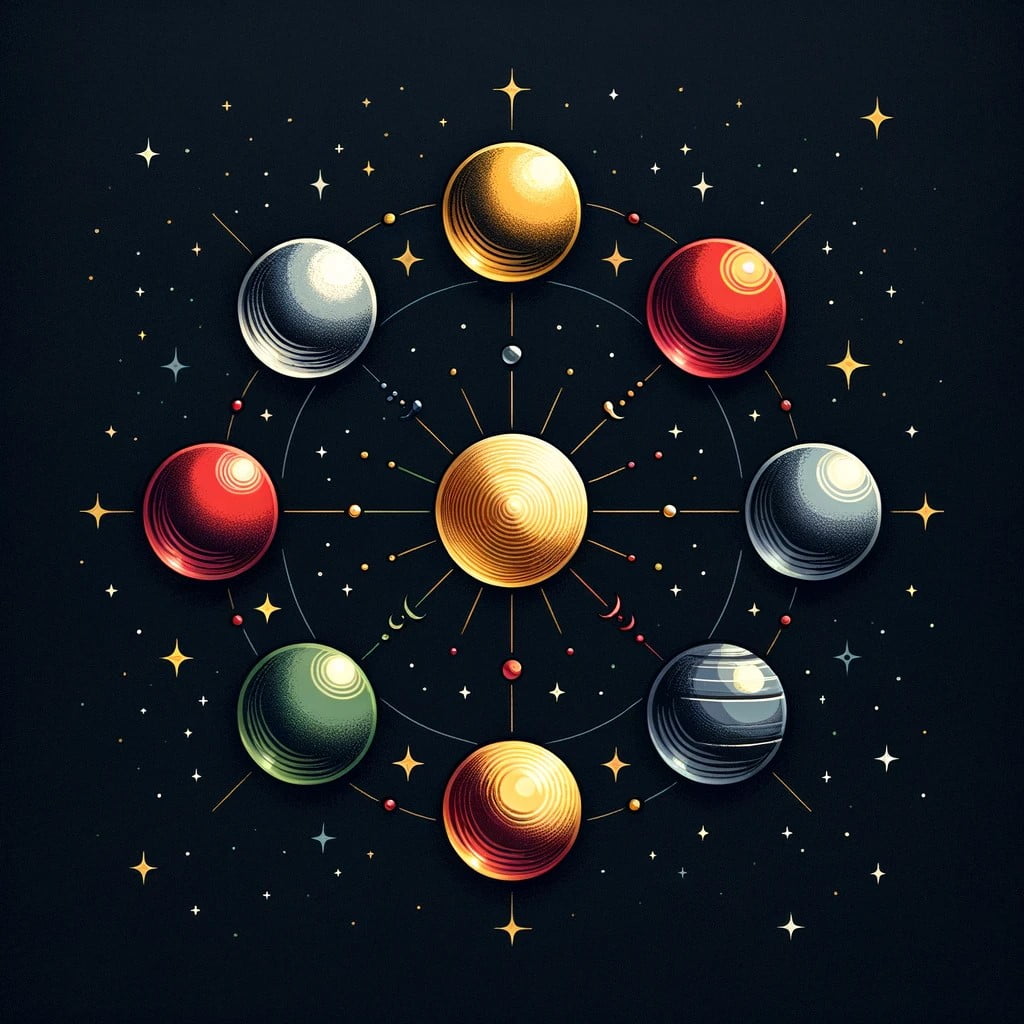Understanding Planets in Vedic Astrology
 April 12, 2024
April 12, 2024 Vedic astrology, or Jyotish Shastra, is an ancient Indian discipline that examines how cosmic forces influence human lives. By analyzing the positions of planets at the time of birth, astrologers craft a birth chart, which serves as the foundation for personality assessments and future predictions.
Table of Contents
The Role of Planets
Planets In Vedic astrology, are viewed not just as objects in space but as divine entities with significant influence on various aspects of life. Each planet has distinct characteristics and governs specific areas such as emotions, intellect, health, and fortune, guiding our paths through life.
The Major Planets and Their Attributes
- Sun (Surya) – The Sun represents the soul and significantly influences authority, leadership, vitality, and health. It plays a crucial role in an individual’s career success and personal development.
- Moon (Chandra) – Managing emotions and the subconscious mind, the Moon affects how individuals process feelings and maintain emotional balance, which is essential for sustaining personal relationships.
- Mars (Mangala) – Mars symbolizes energy and aggression. It controls our physical strength and bravery, significantly influencing how we manage conflicts and challenges.
- Mercury (Budha) – Mercury oversees communication and intellect. It affects learning, cognitive ability, and the way we express our thoughts and ideas.
- Jupiter (Guru) – As the great benefactor, Jupiter impacts wisdom, prosperity, and expansion, contributing to significant achievements in educational and financial areas.
- Venus (Shukra) – Venus influences experiences related to love, aesthetics, and sensory pleasures, steering the courses of romantic relationships and creative endeavors.
- Saturn (Shani) – Saturn, the symbol of time and discipline, imposes structure through challenges and teaches the value of diligence and persistence.
- Rahu and Ketu – These nodes influence the psychological and spiritual aspects of life. Rahu fosters material ambition and introduces significant, often sudden changes. Conversely, Ketu promotes spiritual growth and self-awareness.

Additional Insights into Rahu and Ketu
- Rahu often prompts profound transformations, urging individuals to extend beyond familiar limits, which can lead to growth and unexpected opportunities.
- Ketu encourages a detachment from material desires, concentrating instead on spiritual development and inner serenity.
The Importance of Planetary Transits
Planetary transits, the movement of planets across different houses and signs, are crucial in shaping events and conditions in one’s life. These transits can activate various facets of the birth chart, inducing changes and developments in areas like career, relationships, and personal evolution.
Compatibility and Relationship Guidance
Vedic astrology also provides insights into the compatibility between individuals, which is pivotal for harmonious personal and professional relationships. By comparing planetary positions in two charts, astrologers can predict potential challenges and strengths in relationships.
How Vedic Astrology Can Guide You
Understanding the influences of these divine forces enables individuals to make informed decisions in their personal and professional lives. Vedic astrology offers strategic insights to optimize favorable influences and mitigate challenges, providing a sophisticated approach to overcoming life’s obstacles.
PocketPandit: Your Instant Vedic Astrology Guide
At PocketPandit, we utilize these ancient insights through modern technology to deliver real-time, precise astrological predictions. Whether you’re dealing with questions about life decisions, career paths, love, or finances, PocketPandit offers immediate access to personalized advice.
Explore what Vedic astrology can offer by visiting pocketpandit.com/ask or downloading our app. Let PocketPandit guide you to a more informed and enriching life path.
Up Next: The Sun in Vedic Astrology: A Comprehensive Guide
Follow PocketPandit on Instagram
For a fresh take on Vedic Astrology! From quick insights on zodiac signs, nakshatras, and powerful yogas to fun reels, practical tips, and bite-sized astrological wisdom, we bring the cosmos to your feed. Discover how planetary movements influence your life and explore simple remedies to navigate daily challenges. Follow us and make astrology easy, fun, and part of your everyday vibe. Join the PocketPandit family on Instagram today!
Follow PocketPandit on TikTok
For quick, fun, and engaging Vedic Astrology insights! From bite-sized videos on zodiac signs, nakshatras, and powerful yogas to trending tips on planetary movements and their impact on your life, we make astrology easy and exciting. Whether you’re looking for practical remedies or curious about the secrets of the stars, we’ve got you covered with entertaining content you’ll love. Don’t miss out ,follow PocketPandit on TikTok and let the cosmos guide your scroll!
Follow PocketPandit on Facebook
Unlock the world of Vedic Astrology like never before! Whether you’re curious about zodiac signs, nakshatras, powerful yogas, or how planetary movements influence your day, we’ve got you covered with simple, fun, and insightful updates. Dive into practical tips, discover fascinating astrological secrets, and learn how these cosmic wonders can guide you through life’s twists and turns. Don’t miss out,join the PocketPandit community on Facebook and make astrology a part of your everyday journey!
Subscribe to PocketPandit on YouTube
For in-depth and engaging Vedic Astrology content! Explore detailed videos on zodiac signs, nakshatras, powerful yogas, and planetary movements, all explained in a simple and easy-to-understand way. Whether you’re looking for practical remedies, astrological tips, or a deeper understanding of life’s cosmic influences, our channel has it all. Join the Pocket Pandit Community on YouTube and let astrology guide you with knowledge, clarity, and inspiration. Hit that subscribe button and never miss an update.
